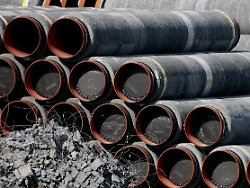Thursday, May 20, 2021
Update
Out of “national interest”
Nord Stream 2 AG: Biden waives sanctions
Now it is official: The US government is waiving punitive measures against Nord Stream 2 AG and its management. Joe Biden also rejects the pipeline as Russia’s geopolitical project. But it is more important to him to avoid a protracted conflict with the ally Germany.
The US government officially waives sanctions against the operating company of the controversial Baltic Sea pipeline Nord Stream 2 and its German managing director. In a report sent to the US Congress on Wednesday, US Secretary of State Antony Blinken wrote that waiving the punitive measures would be “in the national interest of the US”.
The report states that Switzerland-based Nord Stream 2 AG and its managing director Matthias Warnig are involved in activities that violate a US sanctions law. The imposition of punitive measures would have “negative effects on the USA’s relations with Germany, the European Union and other European allies and partners”.
The renunciation of sanctions – a so-called waiver – would also create space for diplomatic talks with the federal government about “risks that a completed Nord Stream 2 pipeline would pose for Ukraine and European energy security”, it says Report.
In addition to Warnig, the exception rule includes the entire management of Nord Stream 2. The subsidiary of the Russian energy giant Gazprom, based in the Swiss city of Zug, is responsible for the planning, construction and subsequent operation of the pipeline, which is almost completed.
Sanctions against Russian participants
In a statement, Foreign Minister Blinken reiterated that the US government was “steadfast” against the pipeline project. “We will continue to oppose the completion of this project, which would weaken European energy security and the energy security of Ukraine and the eastern flank of NATO and EU countries.”
According to Blinkens, sanctions are to be imposed on several Russian ships and companies involved in the construction of the pipeline, as well as a Russian authority.
The US government is strictly against the 1200 kilometer long Baltic Sea tube, which is intended to significantly increase the capacity for Russian natural gas deliveries to Germany. US President Joe Biden argues, like his predecessor Donald Trump, that Germany and Europe would become increasingly dependent on Russia and damage the gas transit country Ukraine.
However, in the dispute over the pipeline, Washington does not want to jeopardize the relations with Germany that have improved again after the Trump years. The US think tank Defense Priorities said on Wednesday that sanctions against Nord Stream 2 AG would ultimately be a “useless gesture” as construction was almost complete and would damage relations with the federal government. “The US shouldn’t tell Germany how to buy its energy.”
Headwind from Congress
In the US Congress, which passed a sanctions law against the construction of Nord Stream 2 in 2019, the government’s current decision met with bipartisan criticism. The chairman of the Senate Foreign Affairs Committee, Democrat Bob Menendez, said the Biden government must do everything possible to stop the completion of the pipeline. This also included sanctions against Nord Stream 2 AG and its managing directors.
Republican Senator Jim Risch spoke of a “gift” for Russian President Vladimir Putin. Republican MP Michael McCaul called the decision “irresponsible”. The reason that the waiver of sanctions serves the national interest is “absolutely ridiculous”. “The completion of this pipeline will threaten the security of Ukraine, increase Europe’s dangerous energy dependence on the Kremlin and further enrich the corrupt Putin regime,” warned McCaul.
US media had already reported on Tuesdaythat Biden wants to forego sanctions against Nord Stream 2 AG. This was welcomed in Berlin: Federal Foreign Minister Heiko Maas said on Wednesday that the Federal Government saw this “as a step that we are taking”. It is important to “continue to discuss problems with one another as constructively as possible”. The German government is sticking to the nine billion euro pipeline, although there has also been criticism from other EU countries.
.
